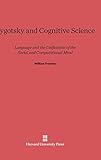Vygotsky and Cognitive Science : Language and the Unification of the Social and Computational Mind / William Frawley.
Material type: TextPublisher: Cambridge, MA : Harvard University Press, [2013]Copyright date: ©1997Edition: Reprint 2014Description: 1 online resource (333 p.)Content type:
TextPublisher: Cambridge, MA : Harvard University Press, [2013]Copyright date: ©1997Edition: Reprint 2014Description: 1 online resource (333 p.)Content type: - 9780674332317
- 9780674332324
- Cognitiewetenschap
- Cognition
- Cognitive Science
- Cognitive science
- Psycholinguistics
- Psychologie
- Taalpsychologie
- Cognition -- Philosophy
- Cognitive science -- Philosophy
- LANGUAGE ARTS & DISCIPLINES / Linguistics / General
- PSYCHOLOGY / Cognitive Psychology
- Psycholinguistics -- Philosophy
- LANGUAGE ARTS & DISCIPLINES / General
- 153
- BF311
- online - DeGruyter
| Item type | Current library | Call number | URL | Status | Notes | Barcode | |
|---|---|---|---|---|---|---|---|
 eBook
eBook
|
Biblioteca "Angelicum" Pont. Univ. S.Tommaso d'Aquino Nuvola online | online - DeGruyter (Browse shelf(Opens below)) | Online access | Not for loan (Accesso limitato) | Accesso per gli utenti autorizzati / Access for authorized users | (dgr)9780674332324 |
Browsing Biblioteca "Angelicum" Pont. Univ. S.Tommaso d'Aquino shelves, Shelving location: Nuvola online Close shelf browser (Hides shelf browser)

|

|

|

|

|

|

|
||
| online - DeGruyter The Invention of Li Yu / | online - DeGruyter The Bill of Rights / | online - DeGruyter America and Europe in the Political Thought of John Adams / | online - DeGruyter Vygotsky and Cognitive Science : Language and the Unification of the Social and Computational Mind / | online - DeGruyter Pre-Raphaelitism : A Bibliocritical Study / | online - DeGruyter Plantation Slavery in Barbados : An Archaeological and Historical Investigation / | online - DeGruyter The American People in the Twentieth Century : Second Edition, Revised / |
Frontmatter -- Contents -- Acknowledgments -- Introduction -- I Foundations for Unification -- 1 Internalism and the Ideology of Cognitive Science -- 2 From Plato’s Problem to Wittgenstein’s Problem -- 3 Architectures and Contexts: Unifying Computational and Cultural Psycholinguistics -- II Three Unities -- 4 Subjectivity: Consciousness and Metaconsciousness -- 5 Control and the Language for Thought -- 6 Control Disorders: Splitting the Computational from the Social -- Epilogue: Is Everything Cognitive Science? -- Notes -- Bibliography -- Index
restricted access online access with authorization star
http://purl.org/coar/access_right/c_16ec
Is a human being a person or a machine? Is the mind a social construction or a formal device? It is both, William Frawley tells us, and by bringing together Vygotsky's sociocultural theory of the mind and cognitive science's computational model, he shows us how this not only can but must be. To do so, Frawley focuses on language, particularly on how the computational mind uses language to mediate the internal and the external during thought. By reconciling the linguistic device and the linguistic person, he argues for a Vygotskyan cognitive science. Frawley begins by exploding the internalist/externalist dichotomy that presently drives cognitive science and falsely pits computationalism against socioculturalism. He replaces the reigning Platonic paradigm of computational mind-science with a framework based on an unusual, unified account of Wittgenstein, thus setting the stage for a Vygotskyan cognitive science centered on three aspects of mind: subjectivity, real-time operation, and breakdown. In this context, he demonstrates how computational psychology accommodates a critical aspect of Vygotskyan theory--private speech--as the mind's metacomputational regulator. An examination of certain congenital disorders (such as Williams Syndrome, Turner Syndrome, and autism) that disrupt speech further clarifies the issue of computational and cognitive control.
Mode of access: Internet via World Wide Web.
In English.
Description based on online resource; title from PDF title page (publisher's Web site, viewed 24. Aug 2021)


